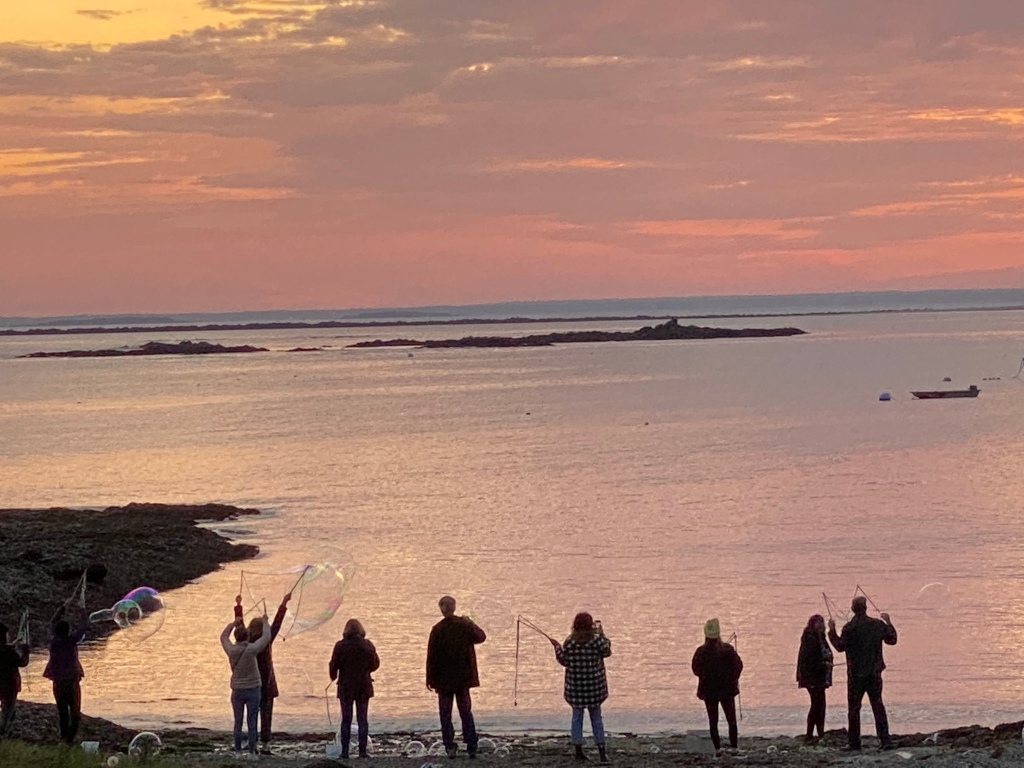
Questions.
When asked to say something about ourselves to a group of strangers we often begin our reply by naming where we live, or listing our marital status or the number of children we have, or what we do for work. Rather than being a starting point for understanding these fact recitations can easily be pathways for stereotyping, as superficial ways to divide us rather than as a starting point to bring us together.
* How could we alter our standard responses so they might lead to building bridges rather than walls? Could we begin by saying “My favorite color is blue” or “I loved Thai food from my first bite of spicy hot noodles with cucumbers and peanuts sprinkled on top”?
*Could we say “I got a dog when I was ten, a Cocker Spaniel puppy who died because her kennel had been infected with distemper.. It was a lesson on how fleeting, how precious, life was, perhaps before I was ready to understand such things.
”Could we say “I grew up on a large lake and when I was ten I would sit by the water writing poems but my mom never saved even one of them”? Could we say “I once raised pigs and chickens for food and I ate them but some time before I made friends with a cow being raised for meat and when it was slaughtered I never ate it nor did I eat beef for more than twenty years after.” What reasoning made me separate cows from chickens or pigs?
* What information can we use which would open ourselves to connections with one another? Sometimes I think we are all out circling our fields looking for trouble. We seem to want to strengthen our fences or build higher walls, to create impenetrable barriers. Why do we feel we need to do that?
* I’ve noticed recently how often people reference movies as if movies are the reality and our lives are fiction. Why does it feel listening to someone making such references that what is on a screen carries more substance than the elements of his or her own life? Why is it that actors are often mistaken for their characters, their on-screen romances are more real than the spouse and children to whom they return when the filming is over?
* How has money become the determining factor in measuring the worth of a human being? How does anyone arrive at a place where he or she has so much money they think they can do anything they want to others? How did we create a world where one person can amass more wealth than entire nations? Was that vast wealth earned by labor? Creativity? Exploitation? Did we earn it through the work of others? Can you name someone who started out poor who became incredibly rich? How did that person make that happen? Can you think of anyone who managed that path without exploitation? (I can think of only one that might fit this criteria.)
* Why do people in power (which mostly means old men) think they will be in charge forever while others who are also aging find themselves pushed to the edges as their bodies and minds deteriorate? How many really old (mostly) men in politics and government believe they can still effectively hold office into their late seventies, eighties, or more and act of if they believe they never will be replaced despite evidence the world which they once knew is long gone? Their determination to continue the course that they once thought worked actually doesn’t and hasn’t for a very long time. Think of the names of such men, heads of state, incapable of rising to new challenges such as climate change or immigration. Why are they able to hang on to their positions?
* How, after a reasonable course of recorded history, is any one person allowed to make decisions that jeopardize others on a mass scale be it via health care politics, personal grudges, or by starting wars that will displace or kill millions?
*And last, because I am now an old person, why does everyone seem to pretend that everyone here will live forever rather than the absolute that everyone will eventually die? Even when some believe they have a direct line to Truth about this process the beauty is that not one of us here knows the answer to the mystery of whether there is a place we go to or whether we drop into nothingness when our physical bodies cease being.
The rocker Jim Morrison wrote “No one here gets out alive”. That is the only solid truth we know from the moment we come into being. I think of this as a great gift, a mystery, a freedom, which might make a great difference if only we were brave enough to face it.


All good questions but i was most stuck by the one about how we introduce ourselves to others. Hello I am Emily and i spend a lot of time discerning the stories that Nature has to tell us; reading tracks in the snow, observing geometric shapes in marsh ice, watching birds and animals, looking for feathers dropped from on high, and listening for clues (or prayers) in the wind.
LikeLike
Beautiful. What a lovely description of how you are in the world
LikeLike